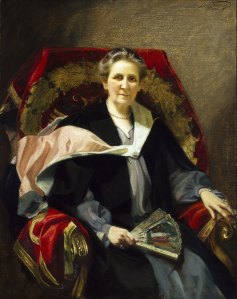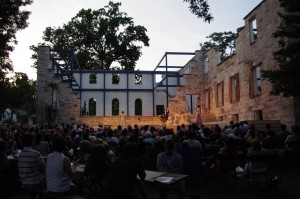He was not of an age, but for all time
He was not of an age, but for all time.
This famous line is buried deep in Ben Jonson’s effusive eulogy to Shakespeare that appeared in the 1623 First Folio preliminaries (the stuff before the plays). It’s also the inscription that author Andrea Mays wrote in my copy of The Millionaire and the Bard. I was so excited to see Andrea speak at the Gaithersburg Book Festival last spring and I really enjoyed her book. It’s the story of Standard Oil executive Henry Folger’s obsessive accumulation of (82!) copies of the First Folio. (233 of the 750 First Folios printed in 1623 are known to survive; over a third of them are at the Folger Shakespeare Library.)
He was not of an age, but for all time.

“Henry Clay Folger (Salisbury, 1927)” by Frank O. Salisbury – Folger Shakespare Library Digital Image Collection
The more I thought about it, the more I thought the inscription applied to Henry Folger himself. Through his philanthropy, he turned his (really quite bizarre) hobby into a wonderful cultural legacy… he created (with the exceptionally anal attention to detail that seemed to be his trademark) and endowed the Folger Shakespeare Library in Washington.
He was not of an age, but for all time.
So, who was he? Folger was born into an old New England family with Nantucket roots. His uncle founded Folger’s coffee. He was frugal with money from his youth, scrappy at working his way through Amherst and Columbia Law, and then lucky at making friends with Charles Pratt, getting hired in Pratt’s family business which later became part of Standard Oil in the 1880s. Henry was great at his job and caught the eye of John D. Rockefeller. Woot! Pay day!
He was not of an age, but for all time.
So, did he do what most do when they hit it big? Nah. He and his wife Emily continued living their comfortable, but frugal lives. This left plenty o’ cash to indulge their passion for buying Shakespeareana. First Folios were the ultimate obsession, but really, they were (in)discriminate purchasers of all things Shakespeare-ish — playbills, costumes, snuff boxes, tchotchkes made out of the mulberry wood from a Stratfordian tree, I even saw some little Shakepeare-y ducks when I visited a few years ago. They were insatiable accumulators of Bardian stuff. And then Elizabethan/Jacobean stuff. They couldn’t be stopped.
He was not of an age, but for all time.
Why did they collect? Henry was a hoarder, let’s face facts. He had a problem. He never got rid of a book in his life, kept all the theater tickets, had lots of scrapbooks, you know what I’m saying. He started loving Shakespeare in college and developed a taste for buying old books before he could really afford them. They were two great tastes that tasted great together to him: Shakespeare and collecting. This became the lifelong focus for his obsessive hoarding as money flowed into his pockets and out to the numerous international book dealers he became friendly with.
He was not of an age, but for all time.

“Emily Jordan Folger (Salisbury, 1927)” by Frank O. Salisbury – Folger Shakespeare Library Digital Image Collection
Emily was a willing and worthy partner in crime. She had an MA from Vassar with her thesis entitled, “The True Text of Shakespeare.” She loved Shakespeare as much as Henry, and while he worked long hours at the Manhattan offices of Standard Oil, she pored over book seller catalogs at their rented townhouse in Bed-Stuy, picking out the treasures they should bid on. She didn’t stop there. While Henry was the shrewd negotiator, tight with a penny (at least until The One That Got Away*), Emily was the cataloger — they didn’t work with a librarian. Emily’s thesis gives a hint, perhaps, to one of the reasons they collected so many First Folios. They had an idea that comparing the textual discrepancies between the First Folios might enlighten scholars as to Shakespeare’s true text for the plays… an idea that did not pan out.
He was not of an age, but for all time.
In any event, the Folger Shakespeare Library is not just Henry’s legacy, but a product of the pair — a real labor of love. I like thinking about the two of them sharing this hobby, enjoying it together, searching for these long lost books, many sitting collecting dust for centuries in country houses in England. I picture Emily and Henry relishing the hunt and lovingly unwrapping the trophies as they were shipped over the pond. For decades, they pretty single-handedly (double-handedly?) denuded England of these cultural treasures… in secret! Henry was publicity shy, partly because he was cheap and thought it would drive up prices if anyone knew he was on the hunt and partly because he was just shy. By the time they became known as collectors, they’d already acquired so much.
He was not of an age, but for all time.
Oddly… really oddly, Henry and Emily unpacked the shipments, meticulously recorded them, and then… packed them back up and put them in storage. Their townhouse was too small, so they rented many storage units. Most of their stuff was never seen again until it was unpacked at the Folger Shakespeare Library during the Depression. So odd. They collected, but not really for themselves. They enjoyed the hunt; but they collected all these treasures “for all time” — to create a library for others to use. The Folger Shakespeare Library in Washington houses their First Folios and other treasures (much of the collection is stored in basement vaults) and makes them available to readers… scholars for whom this collection is an amazing peek into early modern English literature, theater, art, culture, and history. The public rooms at the Folger are beautiful, they offer wonderful educational programming and lovely live performances. The Folger is a real gem in the city of Washington, a city full of cultural gems.
He was not of an age, but for all time.
And the library exists solely because of the Folgers’ lifelong pursuit of these items that perhaps should rightfully have stayed in England. Still, I won’t complain. They achieved something very special with the Folger Shakespeare Library. They planned every detail of the library, and they made sure the endowment to Amherst was large enough to sustain it… no small feat during the Depression, when it opened. Today, it is still a thriving institution. And Henry and Emily are there to watch over it for all time… their ashes are right there in the library’s Old Reading Room. RIP
*I’ll write about The One That Got Away soon.
His wit can no more lie hid, then it could be lost

Title page of the First Folio with copper engraving of Shakespeare by Martin Droeshout. Image courtesy of the Elizabethan Club and the Beinecke Rare Book & Manuscript Library, Yale University.
This is my homage to John Heminge and Henrie Condell, actors who worked with Shakespeare, and in 1623 published the most amazing and unprecedented collection of his plays — the First Folio — a single book that saved from oblivion half of Shakespeare’s plays that come down to us from no other source. Without Heminge and Condell, Shakespeare’s wit would have been lost. Here’s what they wrote in the First Folio:
To the great Variety of Readers.
From the most able, to him that can but spell: there you are number’d. We had rather you were weighed; especially, when the fate of all bookes depends upon your capacities and not of your heads alone, but of your purses. Well ! It is now publique, & you wil stand for your priviledges wee know : to read, and censure. Do so, but buy it first. That doth best commend a Booke, the Stationer saies. Then, how odde soever your braines be, or your wisedomes, make your licence the same, and spare not. Judge your six-pen’orth, your shillings worth, your five shillings worth at a time, or higher, so you rise to the just rates, and welcome. But, whatever you do, Buy. Censure will not drive a Trade, or make the Jacke go. And though you be a Magistrate of wit, and sit on the Stage at Black-Friers, or the Cock-pit, to arraigne Playes dailie, know, these Playes have had their triall alreadie, and stood out all Appeales ; and do now come forth quitted rather by a Decree of Court, then any purchased letters of commendation.
It had bene a thing, we confesse, worthie to have bene wished, that the author himselfe had lived to have set forth, and overseen his owne writings; but since it hath bin ordain’d otherwise, and he by death departed from that right, we pray you do not envie his Friends, the office of their care, and paine, to have collected & publish’d them; and so to have publish’d them, as where (before) you were abused with diverse stolne, and surreptitious copies, maimed, and deformed by the frauds and stealthes of injurious impostors, that expos’d them : even those, are now offer’d to your view cur’d, and perfect of their limbes; and all the rest, absolute in their numbers as he conceived them.
Who, as he was a happie imitator of Nature, was a most gentle expresser of it. His mind and hand went together: And what he thought, he uttered with that easinesse, that wee have scarse received from him a blot in his papers. But it is not our province, who onely gather his works, and give them you, to praise him. It is yours that reade him. And there we hope, to your divers capacities, you will finde enough, both to draw, and hold you: for his wit can no more lie hid, then it could be lost. Reade him, therefore; and againe, and againe : And if then you doe not like him, surely you are in some manifest danger, not to understand him. And so we leave you to other of his Friends, whom if you need, can be your guides: if you neede them not, you can lead yourselves, and others, and such readers we wish him.
John Heminge.
Henrie Condell.
Thank you Heminge and Condell! Really, to have such an impact on language and culture for hundreds of years, simply by doing the thing that Shakespeare himself died without doing — publishing the text of his plays. This preliminary from the First Folio is so interesting. First, you see their hope that people will buy the book so they can recoup something from what must have cost them a huge amount of money and been a big risk to publish. Next, the sweet tribute to Shakespeare, the writer, their friend:
Who, as he was a happie imitator of Nature, was a most gentle expresser of it. His mind and hand went together: And what he thought, he uttered with that easinesse, that wee have scarse received from him a blot in his papers.
And unusual for the time, when plays were seen as transient entertainments, not literature to be read again and again, Heminge and Condell recognize the plays for their literary value and tell you to do just that:
Reade him, therefore; and againe, and againe : And if then you doe not like him, surely you are in some manifest danger, not to understand him.
Also in the First Folio preliminaries is the flowery eulogy from Shakespeare’s peer, the playwright Ben Jonson who gives us the famous line, “He was not of an age, but for all time!”
I am thinking lots about the First Folio lately, as I recently read The Millionaire and the Bard by Andrea Mays. It’s about Henry Folger’s obsessive collecting of First Folios (82! count ’em!) and other Shakespeareana and the building of the Folger Shakespeare Library in Washington… I blogged about my close encounter with a First Folio there a few years ago. I was glad to read more about Folger and his hobby. It’s quite a story… American chutzpah and wealth, eccentricity and obsession, culture clashes, and ultimately foresight and philanthropy. I’ll write about it soon. But it all goes back to Heminge and Condell, because without them, there would be no First Folio, and nothing to fill the Folger’s vast basement vaults.
Live Action
I started this post two whole years ago, but was sidetracked. Here it is with a few updates!
~~~
 I love the local Shakespeare groups in the DC area. The Chesapeake Shakespeare Company is especially fun and vibrant. During the summer, they perform family-friendly productions at the haunted ruins of a Southern Belle finishing school. In the fall, they used to take folks inside those ruins for movable productions in the dark (they did Dracula like that a couple years ago!). Now that they’ve settled into their beautiful Baltimore home, it looks like they plan to stay there for the fall show (though it’s still bloody: Titus Andronicus!).
I love the local Shakespeare groups in the DC area. The Chesapeake Shakespeare Company is especially fun and vibrant. During the summer, they perform family-friendly productions at the haunted ruins of a Southern Belle finishing school. In the fall, they used to take folks inside those ruins for movable productions in the dark (they did Dracula like that a couple years ago!). Now that they’ve settled into their beautiful Baltimore home, it looks like they plan to stay there for the fall show (though it’s still bloody: Titus Andronicus!).

The Chesapeake Shakespeare Company performs during the summer at the haunted ruins of the Patapsco Female Institute (Photo by Teresa Castracane)
Two summers ago, I took my kids to see The Taming of the Shrew at the haunted ruins. Light rain was barely noticed and the actors were just happy to complete a performance (so many thunder storms in Maryland that year… and the ruins are on top of a hill). The outdoor venue is really fun for families, with blankets and picnicking encouraged and no need for kids to sit perfectly still and at attention. There are a few hundred folding chairs available, as well as space to spread out. The stage area is built on several levels in front of the ruins and the actors use window openings and the sides of the ruins for entrances and exits. There’s a lot of activity. This production of the Shrew was pure fun. The comedy was slapstick and silly, with hilarious situations and clownish antics. Great fun for kids.
Back in 2013, CSC was also still playing in community spots. I saw The Two Gentlemen of Verona in “The Other Barn” which was a surprisingly pleasant and intimate community performance space located in a shopping center in Columbia, Maryland. It’s a hike for me to Columbia, but it was well worth it. CSC is a a community-minded organization and makes a great effort to be accessible to its audience.
The performance I attended was preceded by a talk with director Patrick Kilpatrick who spoke a bit about the setting he chose for this production… it takes place in 1991, a year Kilpatrick described as pivotal to American culture… the year “everything changed.” His inspiration (if that’s what you would call it) was a combination of the William Kennedy Smith rape case and the Menendez brothers’ trial. “Proteus and Valentine are the Menendez brothers. They are William Kennedy Smith. Two kids from wealthy and powerful families who think they can have whatever they want, because for their entire lives that has been a fact.” It was an interesting way to look at the play and in fact worked really well, with the boys in their button down oxford shirts and smoking seegars.
And it was a great deal of fun watching the play at The Other Barn… the actors were within a couple feet of me. The Duke’s eight-year-old son was sitting near me on a bench watching his dad and hanging out with him between scenes… I loved the casual atmosphere. The CSC players also entertained us with some fun music before the show and during intermission. Love these performances.
This past summer I visited my favorite spot, Staunton, Virginia, once again. I stayed in a fantastic airbnb place and really enjoyed the town. I took in two performances at the American Shakespeare Center: A Midsummer Night’s Dream and Antony and Cleopatra. I even won a door prize… a poster signed by the cast! The shows were excellent, as always. They continue through November along with The Winter’s Tale and Henry VI, Part I (called Shakespeare’s Joan of Arc).

America Shakespeare Center presents Sarah Fallon as Cleopatra and James Keegan as Antony in ANTONY & CLEOPATRA. Photo by Lindsey Walters. See this video for the actress talking about her role.
I saw ASC do The Winter’s Tale a few years ago in McLean, Virginia. ASC is bringing their Dangerous Dreams Tour to the Alden Theatre in McLean again in 2016. They’ll perform Julius Caesar, The Importance of Being Earnest, and The Life of King Henry V January 22-23. They have a package deal for all three shows at the Alden along with a “Brush up your Shakespeare” talk on January 21. Prices: $88 general public/$62 students and seniors/$50 McLean Community Center district residents… what a bargain, especially if you live in McLean! The DC-area Shakespeare Explorers Meetup group is participating in all the Alden events… maybe I’ll make it out to one!
The Phoenix of Baltimore
I had this post mostly written a whole year ago and I’m not sure why I didn’t post it then, but here it is. Better late than never.
—

Home of the Chesapeake Shakespeare Company, in the historic Mercantile Trust & Deposit Company building at Redwood and Calvert Streets in Baltimore.
Photo by John Lee WYPR
I interrupt my long hiatus from my Shakespeare blogging project to bring you exciting news from Baltimore! My favorite local Shakespeare company, Chesapeake Shakespeare is opening their new “Globe-ish” theater near the Inner Harbor. See this wonderful article in the Baltimore Sun for more info.
 The news is coincidentally slightly tied to my hiatus. I had to take a break from reading and blogging about Shakespeare while I was in graduate school and then I still found no time to blog this past year while I have been working at the National Institute of Standards and Technology (NIST).
The news is coincidentally slightly tied to my hiatus. I had to take a break from reading and blogging about Shakespeare while I was in graduate school and then I still found no time to blog this past year while I have been working at the National Institute of Standards and Technology (NIST).
The new Chesapeake Shakespeare theater is located in the renovated Mercantile Trust and Deposit Co., a lovely brick building built in 1885. The building was one of only a handful that survived the devastating 1904 fire that destroyed much of Baltimore. Fire brigades came to help from nearby cities including Washington DC, New York, and Philly, but they found their equipment useless when they got to Baltimore.
The culprit? Each manufacturer of hydrants and fire hoses used different hose connections. The hoses from DC would not fit on the Baltimore fire hydrants. The city burned and burned while firefighters watched, helpless.
This brings me to the connection to my blogging hiatus. NIST (called National Bureau of Standards in 1904) was asked to study the Baltimore fire and make recommendations to avoid the same issues in the future. Their study found that there were 600 hydrant/hose variations used in the United States at the time.
The result was the establishment of the National Standard Hydrant and accompanying hoses, standards that remain to this day and have been adopted by many cities across the country. Ironically, Baltimore and DC still don’t have compatible hoses and hydrants, but another Great Fire is unlikely… the neighboring firefighters carry adaptors so they can fight each other’s fires.
Long live the Chesapeake Shakespeare Company in its beautiful Baltimore home. I had the pleasure of seeing a (non-Shakespeare) play there soon after it opened. I can’t wait to go back.




